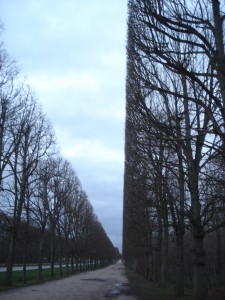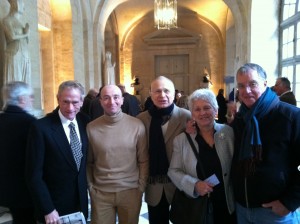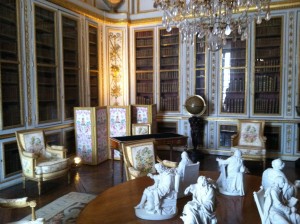
It snowed this morning over Versailles and so, just as during my first visit here in 1969, today there is a rare view of the 17th century classical gardens by Andre Le Notre, one of history’s greatest landscape architects. All white, the grounds are an abstract composition in perfectly cut leafless hedges, trees, alleys and statues. The grounds are closed for a second day but the town of Versailles is sparkling in silver sunshine all focused by frigid breezes in the coldest winter in 30 years. There is a crystal energy that magnifies our feelings joy and accomplishment.
Before returning to the opera house at 2 PM for rehearsal and a 4 PM performance of Le Roi et le fermier, we float through a morning fueled by the resonance of an excellent performance and unforgettable audience response. Today I have several friends who are arrived from Paris, and even a couple from New York City. This is true of many of my colleagues and the impression is that after our first performance in the opera house we have begun to shoot roots in the palace.

No two performances are the same and from day to day a weakness can appear or new insights emerge. This performance is stronger than last night’s and the audience response is equally enthused. The singers, the orchestra, Ryan and the production crew take in the approval, the warm response. Nothing feels better than this.
Many of the musicians in the Opera Lafayette orchestra have studied in Europe; some in Paris, some in Basel, some in Amsterdam and The Hague. We decided to return to America and make our lives at home, in the country where we most clearly “spoke the language” and understood the society. Some of our friends however remained in Europe to grow their careers.
What seems clear when we look over the course of our tour with Le Roi et le fermier in Washington, New York and Versailles is that our roles, our audience and our challenges as Americans are significantly different from those of musicians who live in France or Italy. In America, we are advocates of what is felt as esoteric, elegant, but distant beauty. Often, after we play we listen to people say how we have taken them to a special but far off place. They listen to Baroque music as a foreign language from beautiful times gone by. They see wigs. The response is warm and appreciative. However, in Paris, at Versailles, the audience is listening to something they own. This 18th century opera comique is about who they are and how they got there. It is evidence of a shared cultural journey and the French are both thrilled to hear it, even before the first note sounds, and grateful to have us present this work to them. They are complimented by our efforts. Their reception of the work is visceral. And in their response, our work is validated.

Leaving this world is difficult but each member of the orchestra and each soloist feels that we were given a great gift by Opera Lafayette and as we read our tea leaves or blow out our cake candles or look at the first star rising over the snow covered gardens, I’m sure that each one of us is wishing that we will be back here again.
A recording of Opera Lafayette’s Le Roi et le fermier will be released by Naxos in the coming season and our previous performance of Le Deserteur is presently available. I recommend you get to know Monsigny’s work. And I also recommend a trip to Versailles…but not until May!
My next stop in Europe is Berlin and next program is music from the court of Frederick the Great. I hope you will travel with me through this cold European landscape and through the warmer climates of the music of Graun, Benda, Duport and Bach.
Your Palace correspondent!
Andrew Appel




So moving Andrew! As a camp follower, I feel same. Have not come off the cloud yet.
no need to rush. Let’s hang out on this cloud for a while!